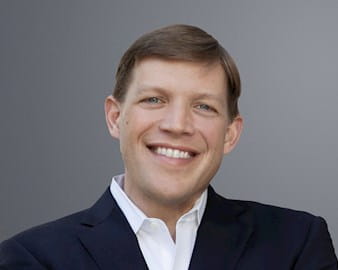
When the Reverend Peter Lane, AB ’99, MBA ’19, attended Booth, he already had the conviction of knowing what he wanted to do next. Lane, the executive director of the ReVive Center for Housing and Healing, a Chicago-based nonprofit working with the chronically homeless, was eager to learn to lead an institution that brings about human flourishing, by combining his theological training with hard business skills.
Here, Lane shares more about his journey and guiding principles, and explains why his studies in economics felt similar to his divinity training.
What led you to Booth?
Before I attended Booth, I was pastor of the St. Paul & the Redeemer Episcopal Church in Hyde Park. I really enjoyed leading a small local institution, but I went to Booth to get the skills to lead a bigger nonprofit. I needed the hard skills of accounting and finance, which I knew were my weaknesses. I enrolled in the Evening MBA Program, but ended up taking classes full time during the day and finished in just 18 months. Studying economics, leadership, and finance at the University of Chicago was a great privilege.
What factors from your theological training inspired your decision to enter the nonprofit world?
My dad was a Booth graduate, and he taught me that every human has inherent dignity and incomparable worth. That’s something that was extremely meaningful to me as a kid, and both my work in the church and my work in the nonprofit attempt to live out that calling.
I also believe that people often find purpose and meaning through their involvement with well-run institutions, which can lead to human flourishing. I was inspired by Jesus’s teachings to feed the hungry and work with the oppressed.
Was there a class that stands out?
In many of my classes, I felt like I had a great deal to learn and was almost starting from scratch. Specifically, John Gallemore [now at the University of North Carolina] was an engaging professor, and made learning how a balance sheet and income statement are tied together fascinating. Accounting is detail-oriented work, and he made it interesting.
How are you using some of the skills you learned at Booth?
As a small local nonprofit on the West Side of Chicago, we serve 1,500 people per year, and what I learned at Booth has been essential for the work we’re doing. We recently applied for and received a $10 million grant, and without what I learned at Booth, we would not have gotten it. We also worked with the Rustandy Center for student-led consulting projects through the Booth COVID-19 Volunteers program.
What are some of the parallels you draw between learning economics and learning theology?
Both offer an understanding of who humans are and how they act in the world. Nowadays, both help me think carefully about how communities work together. But economics is different from theology in that it doesn’t have an outcome in mind. If theology tells me how things might be—a society that honors human dignity—then economics tells me how things actually are and what tools we might use to move society toward its shared goals.


